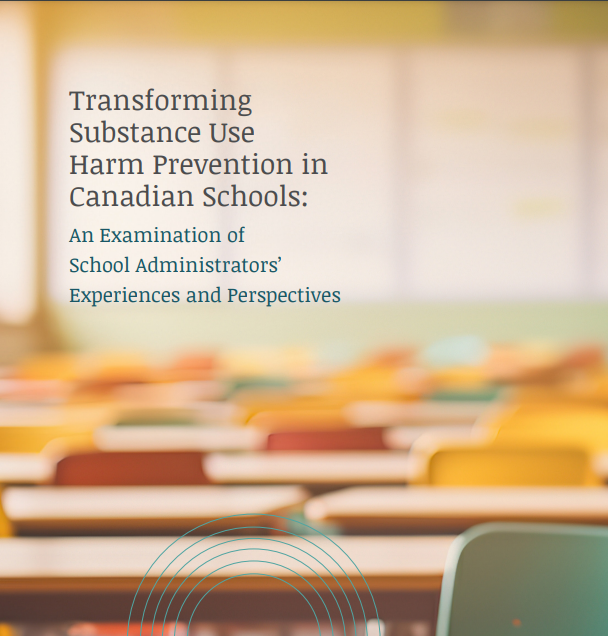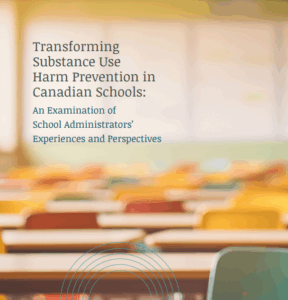Publications
Featured Publication
Transforming Substance Use Harm Prevention in Canadian Schools: An Examination of School Administrators’ Experiences and Perspectives, presents findings from a recent survey of Canadian kindergarten to 12th grade school administrators conducted as part of Wellstream’s Transforming Substance Use Harm Prevention in Schools initiative. The survey aimed to characterize current practices and identify needs related to substance use education and intervention in schools.
Transforming Substance Use Harm Prevention in Canadian Schools: An Examination of School Administrators’ Experiences and Perspectives, presents findings from a recent survey of Canadian kindergarten to 12th grade school administrators conducted as part of Wellstream’s Transforming Substance Use Harm Prevention in Schools initiative. The survey aimed to characterize current practices and identify needs related to substance use education and intervention in schools.
Explore Publications
Browse publications by topic, search with keywords, or filter by methods
- All
- 2SLGBTQIA health
- Alcohol
- Cannabis
- Climate change
- Community-based research
- COVID-19
- Discourse analysis
- Education
- Evaluation
- Family
- Healthcare providers
- Homelessness
- Inequities
- Mental health
- Mental health care
- Methods
- Multisite analysis
- Opioid
- Parents/caregivers
- Photovoice
- Policy
- Public health
- Scoping review
- Sexual and gender minorities
- Social determinants of health
- Social media
- Substance use
- Youth



Taking stock of youth substance use portrayals: A critical content analysis of Canadian news media, 2016-2024.
A mixed-methods critical content and discourse analysis exploring the characteristics and consequences of youth substance use as portrayed in Canadian news media.
Social Science & Medicine
2025
Tags: Public health, Substance use, YouthMethods: Mixed-methods


Youth and young adult cannabis research – Critical approaches to advancing the field
This special section of the International Journal of Drug Policy brings together empirical and conceptual contributions to youth cannabis research through diverse methodological and critical social science approaches.
International Journal of Drug Policy
2025
Methods: Other


Addressing student substance use in Canadian schools: an exploration of administrators’ perspectives
To support the development of evidence-informed guidance for Canadian Kindergarten through Grade 12 (K-12) school administrators, this study examined their perceptions of the scope of student substance use and the challenges they face in responding within school settings.
Health Promotion International
2025
Tags: Policy, Substance use, YouthMethods: Mixed-methods

Contributors to positive mental health among youth: a qualitative study in British Columbia, Canada
This study sought to explore youth’s perspectives and beliefs about mental health from a strengths-based perspective, including identifying factors which enable them to feel supported.
Health Promotion International
2025
Methods: Qualitative
Helping men build better intimate partner relationships: Canadian provider perspectives.
The aim of this study was to describe the strategies used by Canadian healthcare providers to assist men in strengthening their intimate partner relationships.
Health Education Journal
2025
Methods: Qualitative

COVID-19-related stress and positive coping strategies among young adults in Canada and France: A latent class analysis
This study uses data collected from a large and diverse sample of young adults from Canada and France during the second year of the COVID-19 pandemic to respond to the following objectives: 1) identify sub-groups of young adults with a similar coping pattern using latent class analysis; 2) examine whether these coping sub-groups differ by sociodemographic characteristics; and 3) examine the association of sub-group membership and mental health-related outcomes, controlling for sociodemographic characteristics.
PLOS Mental Health
2025
Tags: Mental health, YouthMethods: Quantitative

Models and key elements of integrated perinatal mental health care
This study consists of a scoping review to identify and synthesize evidence on existing models and key elements of integrated PMH, with data extracted according to PRISMA guidelines.
PLoS Mental Health
2025
Methods: Review
Comfort in Providing Care and Associations With AttitudesTowards Substance Use: A Survey of Mental Health Clinicians at an Urban Hospital in Vancouver, Canada
Stigma is a major driver of harms associated with substance use and can interfere with the provision of high-quality, effective healthcare for people who use drugs. Our study aimed to explore the relationship between mental health clini-cians' comfort in providing substance use care and their attitudes towards substance use.
Journal of Psychiatric and Mental Health Nursing
2025
Methods: Quantitative
Exploring How Youth Use TikTok for Mental Health Information in British Columbia: Semistructured Interview Study With Youth.
One of the first studies to explore the experiences of youth with TikTok, specifically their experiences accessing mental health information on the platform, the findings provide important direction for future research.
JMIR Infodemiology
2024
Tags: Social media, YouthMethods: Qualitative

2S/LGBTQ+ youth substance use and pathways to homelessness: A photovoice study.
Supports for 2S/LGBTQ+ youth, who use drugs in the lead-up to and after becoming homeless, should be informed by youths' pursuits of becoming and belonging in the context of marginalization.
International Journal of Drug Policy
2024
Tags: 2SLGBTQIA health, Homelessness, Photovoice, Sexual and gender minorities, Social determinants of health, YouthMethods: Qualitative
Evidence gap: Data from clinical contexts needed to better support youth experiencing the mental health impacts of climate change.
Despite growing population-level data about the negative mental health consequences of climate change on youth, there is limited data from clinical contexts.
Journal of Environmental Psychology
2024
Methods: Other


Identifying mechanisms of youth mental health promotion: A realist evaluation of the Agenda Gap programme.
Agenda Gap as a Third Place / Third Space.
PLoS Mental Health
2024
Tags: Evaluation, YouthMethods: Qualitative
Intersecting transitions among 2S/LGBTQ+ youth experiencing homelessness: A scoping review
Two-Spirit, lesbian, gay, bisexual, transgender, queer, and other sexual and gender minority (2S/LGBTQ+) youth under 30 years of age are inequitably impacted by homelessness.
Children and Youth Services Review
2024
Tags: 2SLGBTQIA health, Homelessness, Scoping review, Sexual and gender minorities, Social determinants of health, YouthMethods: Review

Developing consensus to enhance perinatal mental health through a model of integrated care: Delphi study
Perinatal mental illness is an important public health issue, with one in five birthing persons experiencing clinically significant symptoms of anxiety and/or depression during pregnancy or the postpartum period. The purpose of this study was to develop a consensus-based model of integrated perinatal mental health care to enhance service delivery and improve parent and family outcomes.
PLoS One
2024
Tags: Mental healthMethods: Other
Overlapping pandemic- and climate-related worry: Prevalence and association with mental health outcomes in a Canadian sample
Evidence of the population-level mental health impacts of COVID-19.
Journal of Mental Health and Climate Change
2023
Tags: Climate change, InequitiesMethods: Quantitative
Parent psychological distress and parent child relationships two years into the COVID-19 pandemic: Results from a Canadian cross-sectional study
Mental health impacts of the COVID-19 pandemic have not been felt equally within populations.
PLoS One
2023
Tags: Family, Mental health, Parents/caregiversMethods: Quantitative
Food-related worry and food bank use during the COVID-19 pandemic in Canada: Results from a nationally representative multi-round study
Early in the COVID-19 pandemic, nearly one in five adults in Canada worried about having enough food to meet their household's needs.
BMC Public Health
2023
Methods: Quantitative

Engaging families and parent advocates in research on substance use and drug policy reform: Guiding principles from a Canadian community-academic partnership
Canada is in the midst of a public health emergency in drug poisoning (overdose) deaths. In this context parents, and especially mothers, of those who have died from drug poisoning have mobilised to advocate for urgent responses and drug policy reforms.
Drug and Alcohol Review
2023
Methods: Other
Mental distress and virtual mental health resource use amid the COVID-19 pandemic: Findings from a cross-sectional study in Canada
This paper characterizes levels of mental distress among adults living in Canada amid the COVID-19 pandemic and examines the extent of virtual mental health resource use, including reasons for non-use, among adults with moderate to severe distress.
Digital Health
2023
Tags: Mental health care, Public healthMethods: Quantitative


Advancing socioecological mental health promotion intervention: A mixed methods exploration of Phase 1 Agenda Gap findings
Protecting and promoting the mental health of youth under 30 years of age is a priority, globally.
Frontiers in Public Health
2023
Tags: YouthMethods: Mixed-methods
Moderation of the association between COVID-19-related income loss and depression by receipt of financial support: Repeated cross-sectional surveys of young adults in Canada and France
To mitigate the adverse effects of the COVID-19 pandemic on financial resources, governments and family/friends mobilized financial support interventions (e.g., emergency aid funds) and assistance.
SSM Population Health
2023
Methods: Quantitative


Adolescent substance use treatment and care: Troubling assumptions about autonomy and (in)capacity to consent
British Columbia (BC), Canada, is an epicenter of North America's overdose crisis.
Journal of Adolescent Health
2023
Tags: Mental health care, Substance use, YouthMethods: Other
Emotional response patterns, mental health, and structural vulnerability during the COVID-19 pandemic in Canada: A latent class analysis
The COVID-19 pandemic has contributed to increases in negative emotions such as fear, worry, and loneliness, as well as changes in positive emotions, including calmness and hopefulness.
BMC Public Health
2023
Methods: Quantitative
Young adults’ mental health and unmet service needs in the context of the COVID-19 pandemic across Canada and France
While young adults experienced mental health challenges during the COVID-19 pandemic, little is known about how their mental health needs were subsequently met through access to mental health services (MHS).
Community Mental Health Journal
2023
Tags: Inequities, Mental health care, YouthMethods: Quantitative
Mental health inequities amid the COVID-19 pandemic: Findings from three rounds of a cross-sectional monitoring survey of Canadian adults
Adverse mental health impacts of the COVID-19 pandemic are well documented; however, there remains limited data detailing trends in mental health at different points in time and across population sub-groups most impacted.
International Journal of Public Health
2022
Tags: Inequities, Public healthMethods: Quantitative
Using photovoice to understand experiences of opioid use among sexual and gender minority youth
In Canada, sexual and gender minority youth use opioids at disproportionately high rates. Yet, little is known about the distinct contexts of opioid use within this group, challenging capacity to develop well founded policy and practice supports.
Culture, Health & Sexuality
2022
Methods: Qualitative

Widening mental health and substance use inequities among sexual and gender minority populations: Findings from a repeated cross-sectional monitoring survey during the COVID-19 pandemic
This paper examines the mental health and substance use impacts of the COVID-19 pandemic among sexual and gender minority (SGM) populations as compared to non-SGM populations, and identifies risk factors for mental health and substance use impacts among SGM groups.
Psychiatry Research
2022
Methods: Quantitative
Correlates of suicidal ideation related to the COVID-19 pandemic: Repeated cross-sectional nationally representative Canadian data
With significant levels of mental distress reported by populations, globally, the magnitude of suicidal ideation during and beyond the COVID-19 pandemic is a central concern.
Population Health
2022
Tags: Public healthMethods: Quantitative

Increases in alcohol and cannabis use associated with deteriorating mental health among LGBTQ2+ adults in the context of COVID-19: Findings from a repeated cross-sectional study in Canada
Lesbian, gay, bisexual, trans, other queer, and Two-Spirit (LGBTQ2+) people are particularly at risk for the psycho-social consequences of the COVID-19 pandemic, though population-tailored research within this context remains limited.
International Journal of Environmental Research and Public Health
2021
Methods: Quantitative
Impacts of the COVID-19 pandemic on family mental health in Canada: Findings from a multi-round cross-sectional study
Pandemic-related disruptions, including school, child care, and workplace closures, financial stressors, and relationship challenges, present unique risks to families' mental health.
International Journal of Environmental Research and Public Health
2021
Tags: Family, Parents/caregiversMethods: Quantitative


Cannabis Education Resources for Parents: An Environmental Scan and Critical Content Analysis in the Context of Legalization
Cannabis was recently legalized for adult use in Canada and many American states. In this context, there is a pressing need for educational resources - aimed at youth and their parents/caregivers - to reduce potential harm.
Drugs Education, Prevention and Policy
2021
Tags: Cannabis, Education, Parents/caregivers, Substance use, YouthMethods: Qualitative

“I’m not your reality show”: Perspectives of bereaved mothers’ engagement with the news media to advance drug policy reform
North America's overdose crisis is one of the most urgent public health issues of our time and parents bereaved from substance use are a prominent voice within the news media.
Social Science and Medicine
2021
Tags: Parents/caregivers, Policy, Substance useMethods: Qualitative
Reddit users’ experiences of suicidal thoughts during the COVID-19 pandemic: A qualitative analysis of r/Covid19_support posts
The COVID-19 pandemic is having considerable impacts on population-level mental health, with research illustrating an increased prevalence in suicidal thoughts due to pandemic stressors.
Frontiers in Public Health
2021
Tags: Social mediaMethods: Qualitative
Examining associations between food worry and mental health during the early months of the COVID-19 pandemic in Canada
Little is known about the association between mental health and diminished food worry during the COVID-19 pandemic.
Canadian Journal of Public Health
2021
Methods: Quantitative

“It’s a bit of a double-edged sword”: Motivation and personal impact of bereaved mothers’ advocacy for drug policy reform
North America's overdose crisis is an urgent public health issue that has resulted in thousands of deaths. As the crisis began to take hold across Canada in 2016, bereaved parents, mainly mothers, emerged as vocal advocates for drug policy reform and harm reduction, using their stories to challenge the stigma of drug-related death.
Qualitative Health Research
2021
Tags: Parents/caregivers, Policy, Substance useMethods: Qualitative
Legal regulation as a human rights and public health approach to currently prohibited substances
The editors of this special section of the journal present a collection of 10 conceptual and empirical papers developed in response to an International Research Roundtable, held in June 2019, sponsored by the Peter Wall Institute for Advanced Studies.
International Journal of Drug Policy
2021
Tags: Policy, Public health, Substance useMethods: Other
Examining the impacts of the COVID-19 pandemic on family mental health in Canada
In the first wave of the COVID-19 pandemic, social isolation, school/child care closures and employment instability have created unprecedented conditions for families raising children at home.
BMJ Open
2021
Tags: Family, Parents/caregiversMethods: Quantitative
Associations between periods of COVID-19 quarantine and mental health in Canada
Since the onset of the COVID-19 pandemic, many jurisdictions, including Canada, have made use of public health measures such as COVID-19 quarantine to reduce the transmission of the virus.
Psychiatry Research
2021
Tags: COVID-19, Public healthMethods: Quantitative

Involuntary stabilization care of youth who overdose: A call for evidence- and ethics-informed substance use policy
As is the case across Canada, the province of British Columbia is in the midst of an opioid overdose crisis. In response to the devastating impacts of this crisis on youth (under 19 years of age), the provincial government is considering amending the Mental Health Act to allow for involuntary, hospital-based stabilization care of youth following an overdose.
Canadian Journal of Public Health
2021
Tags: Mental health care, Substance use, YouthMethods: Other
A portrait of the early and differential mental health impacts of the COVID-19 pandemic in Canada: Findings from the first wave of a nationally representative cross-sectional survey
Evidence on the population-level mental health impacts of COVID-19 are beginning to amass; however, to date, there are significant gaps in our understandings of whose mental health is most impacted, how the pandemic is contributing to widening mental health inequities, and the coping strategies being used to sustain mental health.
Preventative Medicine
2021
Tags: Inequities, Public healthMethods: Quantitative

Bereaved mothers’ engagement in drug policy reform: A multisite qualitative analysis
Globally, a tainted drug supply is claiming the lives of tens of thousands of people who use drugs and current measures are not quelling this crisis.
International Journal of Drug Policy
2021
Tags: Parents/caregiversMethods: Qualitative
Use of asynchronous virtual mental health resources for COVID-19 related stress among the general population in Canada: Findings from a nationally representative cross-sectional survey
The COVID-19 pandemic has resulted in profound mental health impacts among the general population worldwide.
International Journal of Drug Policy
2020
Tags: Public healthMethods: Quantitative


Assessing the impacts of the Agenda Gap intervention for youth mental health promotion through policy engagement: A study protocol
Mental health challenges are a leading health concern for youth globally, requiring a comprehensive approach incorporating promotion, prevention and treatment within a healthy public policy framework.
International Journal of Mental Health Systems
2020
Methods: Other
“Am I gonna get in trouble for acknowledging my will to be safe?”: Identifying the experiences of young sexual minority men and substance use in the context of an opioid overdose crisis
North America and other parts of the globe are in the midst of a public health emergency related to opioid overdoses and a highly contaminated illicit drug supply.
Harm Reduction Journal
2020
Methods: Qualitative


Equipping youth for meaningful policy engagement: An environmental scan
To better address the mental health and substance use crises facing youth globally, a comprehensive approach, inclusive of mental health promotion is needed. A key component of mental health promotion is policy intervention to address the social and structural determinants of health.
International Journal of Health Promotion
2020
Tags: YouthMethods: Review
“You can’t chain a dog to a porch”: A multisite qualitative analysis of youth narratives of parental approaches to substance use
Reducing harms of youth substance use is a global priority, with parents identified as a key target for efforts to mitigate these harms. Much of the research informing parental responses to youth substance use are grounded in abstinence and critiqued as ineffective and unresponsive to youth contexts. AI-based Summary: In simple terms: the study found that strict “zero tolerance” rules about drugs or alcohol—where parents forbid any use—don’t really work for teens. Teens said these rules feel out of touch with their lives and don’t help them make safe choices. Instead, parents who talk openly, understand the realities teens face, [...]
Harm Reduction Journal
2019
Tags: Family, Parents/caregivers, YouthMethods: Qualitative
Understanding the mental health and recovery needs of Canadian youth with mental health disorders: A Strategy for Patient-Oriented Research (SPOR) collaboration
While considerable progress is being made to understand the health and self-management needs of youth with mental health disorders, little attention has focused on the mental health and recovery needs that the youth themselves identify"this despite a national priority to incorporate patient-oriented research into the development and assessment of mental health services.
International Journal of Mental Health Systems
2019
Tags: YouthMethods: Other
Disrupting assumptions of risky play in the context of structural marginalization: A community engagement project in a Canadian inner-city neighbourhood
Play is a complex, taken-for-granted activity that is often assumed to be universal in how it is conceptualized and experienced. In a global context, play has been identified as a human right for all children (UNICEF, 2006).
Health and Place
2019
Methods: Qualitative

Parents are the best prevention’? Troubling assumptions in cannabis policy discourses in the context of legalization in Canada
Canada has announced that it will legalize cannabis on October 17, 2018, and as a result of this impending drug law reform the need to develop prevention resources and drug education " in schools, in public health, and for parents " has emerged as a public concern and a policy priority.
International Journal of Drug Policy
2019
Methods: Qualitative
A guide to multi-site qualitative analysis
The aims of multisite qualitative research, originally developed within the case study tradition, are to produce findings that are reflective of context, while also holding broader applicability across settings.
Qualitative Health Research
2018
Tags: Multisite analysisMethods: Other

Assessing the impacts and outcomes of youth driven mental health promotion: A mixed-methods assessment of the social networking action for resilience study
Mental health challenges are the leading health issue facing youth globally. To better respond to this health challenge, experts advocate for a population health approach inclusive of mental health promotion; yet this area remains underdeveloped.
Journal of Adolescence
2018
Tags: YouthMethods: Mixed-methods

Setting the legal age for access to cannabis in Canada: Bridging neuroscience, policy and prevention
The United States and Canada are both engaged in cannabis policy reforms with a number of US states legalizing or decriminalizing use, possession, cultivation, and sale, and the Federal Government of Canada poised to legalize cannabis in 2018.
Neuropsychopharmacology Reviews
2017
Tags: YouthMethods: Other
Developing Harm Reduction in the context of youth substance use: Insights from a multi-site qualitative analysis of young people’s harm minimization strategies
Youth substance use programming and educational strategies are frequently informed by prevention approaches that emphasize abstinence goals, which often do not resonate with youth in their lack of acknowledgment of young people's social context and how young people perceive positive effects of substance use.
Harm Reduction
2017
Tags: Multisite analysis, YouthMethods: Qualitative
The politics of knowledge: Implications for understanding and addressing mental health and illness
While knowledge represents a valuable commodity, not all forms of knowledge are afforded equal status. The politics of knowledge, which entails the privileging of particular ways of knowing through linkages between the producers of knowledge and other bearers of authority or influence, represents a powerful force driving knowledge development.
Nursing Inquiry
2014
Tags: Mental healthMethods: Other

Weeding out the information: An ethnographic approach to exploring how young people make sense of the evidence on cannabis
Contradictory evidence on cannabis adds to the climate of confusion regarding the health harms related to cannabis use. This is particularly true for young people as they encounter and make sense of opposing information on cannabis.
Harm Reduction Journal
2013
Tags: Substance use, YouthMethods: Qualitative



